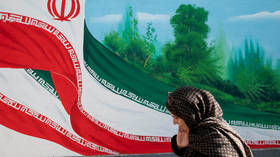Fashion faux pas? Covid-19 exposes another fault line in globalisation as the West’s obsession with cheap clothes ends in disaster

British retailers, pushed to the brink of bankruptcy by the shutting down of the economy, have cancelled £2.4 billion of contracts with factories in Bangladesh, throwing already poorly-paid garment workers onto the garbage heap.
When the coronavirus hit no one had any inkling as to the tsunami of damage to the global economy that would be left in its wake or would have guessed the great British High Street would be changed forever.
The Western world is addicted to cheap, fast fashion and its retailers are a mainstay of every shopping precinct in the UK.
Things go on and off trend faster than you can say “drop-crotch jeans” and the behemoths of the fast fashion industry continue to churn out millions and millions of items, season after season as our infatuation with how we dress overwhelms us.
It’s an obsession. How we look is who we are. And who we are is key in the identity-driven world of the West.
Also on rt.com The good, the bad and the ugly: How politicians and celebrities are turning a pandemic into a fashion paradeOur enthusiasm for fashion is largely serviced by the hardworking folk of Southeast Asia, in particular, for British consumers, the garment factories of Bangladesh.
So when British retailers such as Arcadia, Sports Direct, Frasers Group, Asda, Debenhams, New Look and Peacocks among others decided to cancel £2.4 billion worth of contracts that were held with Bangladeshi businesses, this was always going to be a massive hit to Dhaka.
Understandably, the Bangladesh government is upset. It’s trying to insist that the contracts be honoured while at the same time the British businesses are adamant they will not buy stock that they cannot shift.
You can see the issue from both sides and you can also see how it is going to end.
Globalisation and an addiction to cheap fashion are key here. British garments were once famously produced in Britain, where mills and tanneries ran round the clock to meet demand.
Also on rt.com ‘Inspired by mountains, sky & edelweiss’: Chechen leader’s daughter dazzles Paris with traditional dress & hijab fashions (VIDEO)The demise of the textile industry was a painful and drawn out process that dragged a nation through some very tough times over nearly 20 years during the 1960s and 1970s.
And all that work went abroad. To places like Bangladesh, India, Turkey, Vietnam.
Cheap labour made for higher profits for British companies, and the huge populations in those countries provided a plentiful and inexpensive workforce that wasn’t beholden to strident unions or to limited working hours and fussy contracts.
Once the pain and disappointment of the disappearing domestic industries had dissipated, it was back to business and bumper profits for the fashion business. Thanks to globalisation.
People began to appreciate the cheaper clothing, maybe not for the quality, but certainly for the price.
It became easier to upgrade a wardrobe throughout the year and the growing number of clothes banks and secondhand clothes markets swallowed up the unwanted and discarded items to regurgitate them in countries around the world that are not so fussy about wearing the latest “in” crop top or cargo trousers.
The result of this has been horrific. In Ghana, the destination of so many British hand-me-downs, tonnes and tonnes of clothes are left to rot in putrid toxic mountains on wasteland or on beaches because the infrastructure for dealing with the imported clothing is overwhelmed.
Also on rt.com Who funds Victoria Beckham’s staff layoffs? Guess you know the answer… and bet you don’t like itShocking estimates suggest that every day more than 50 tonnes of secondhand clothes are discarded in this way in the West African nation. Some of those cast-off items found in the street markets of Accra bear the labels of those very same companies who have just pulled the plug on their Bangladesh contracts.
So maybe, just maybe, there might be some respite to Ghana and its overwhelmed secondhand vendors thanks, in a roundabout way, to the impact of Covid-19 on the ability of people in the UK to shop for new clothes.
Not that the recently and suddenly unemployed Bangladeshi husband and wife, unable to work at their shuttered garment factory, will celebrate that. Or that the British businesses ordering, selling and dumping these clothes will even care.
The pandemic could reboot the whole mess. People might hold on to clothes longer, shops could hold more sensible levels of stock, even selling at higher prices forced upon them by having to pay more themselves when purchasing from suppliers abroad who are no longer willing to trust them should something go wrong.
Thinking of binning that coat you were looking to replace next winter? I’d hold on to it if I were you.
The statements, views and opinions expressed in this column are solely those of the author and do not necessarily represent those of RT.















